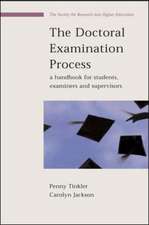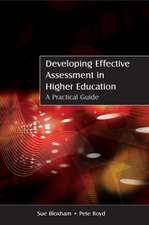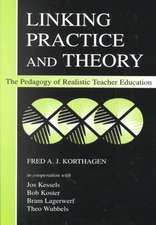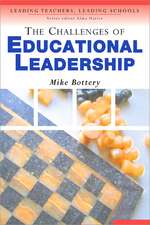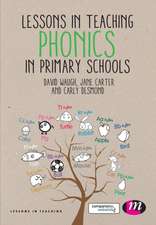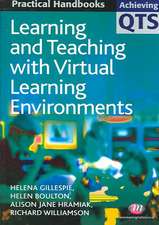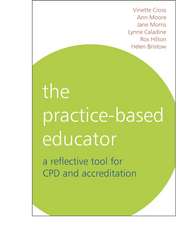Collaborative Learner Autonomy: A Mode of Learner Autonomy Development
Autor Soufiane Blidien Limba Engleză Hardback – 27 sep 2016
| Toate formatele și edițiile | Preț | Express |
|---|---|---|
| Paperback (1) | 638.76 lei 6-8 săpt. | |
| Springer Nature Singapore – 27 iun 2018 | 638.76 lei 6-8 săpt. | |
| Hardback (1) | 644.95 lei 6-8 săpt. | |
| Springer Nature Singapore – 27 sep 2016 | 644.95 lei 6-8 săpt. |
Preț: 644.95 lei
Preț vechi: 758.77 lei
-15% Nou
Puncte Express: 967
Preț estimativ în valută:
123.42€ • 131.97$ • 102.90£
123.42€ • 131.97$ • 102.90£
Carte tipărită la comandă
Livrare economică 17 aprilie-01 mai
Preluare comenzi: 021 569.72.76
Specificații
ISBN-13: 9789811020469
ISBN-10: 9811020469
Pagini: 283
Ilustrații: XXXII, 231 p. 57 illus., 56 illus. in color.
Dimensiuni: 155 x 235 x 16 mm
Greutate: 0.54 kg
Ediția:1st ed. 2017
Editura: Springer Nature Singapore
Colecția Springer
Locul publicării:Singapore, Singapore
ISBN-10: 9811020469
Pagini: 283
Ilustrații: XXXII, 231 p. 57 illus., 56 illus. in color.
Dimensiuni: 155 x 235 x 16 mm
Greutate: 0.54 kg
Ediția:1st ed. 2017
Editura: Springer Nature Singapore
Colecția Springer
Locul publicării:Singapore, Singapore
Cuprins
Introduction.- Archaeology of the Concept of Autonomy.- Contextual and Implementation Perspective of Autonomous Learning.- Research Methodology.- Impact of Learners’ Perception on the Implementation of Autonomous Learning.- Impact of Teachers’ and HEIs’ Practices on the Development of Learner Autonomy.- CLA: Learner Autonomy Redefined in the OMANI Context.- Conclusion.
Notă biografică
Dr. Soufiane Blidi is a senior ELT practitioner with twenty years of experience in teaching English, both language skills and content applied linguistics and translation courses, in Tunisia and Oman. He is currently the acting Dean of the Faculty of Language Studies at Sohar University, Oman and a member of the Laboratoire de Recherches d'Analyse de Discours, Sfax University, Tunisia. He has contributions in the design, review and evaluation of undergraduate and post-graduate programmes and a committed interest in curriculum design and evaluation within the perspectives of learner involvement, autonomy, and collaboration.
He is an advocate of learner autonomy development through effective teacher guidance and peer scaffolding in an environment of shared responsibility. Research projects in the pipeline cover: learner involvement in extra-curricula activities; the impact of autonomous and collaborative learning on the learners' language life skills; and the development of autonomous reading culture.
Textul de pe ultima copertă
The book investigates interest groups and various learning circles, Reading Circles (RCs) learning opportunity in particular, as a mode of in-class and beyond class autonomous learning in the context of English Language Teaching (ELT) at tertiary level in Oman, and in similar contexts in the Middle East and North Africa (MENA) region. This investigation presents learners’ positive perceptions of learner autonomy and their readiness to adopt related practices. Building on findings from these RCs, the book introduces collaborative learner autonomy (CLA) as a novel concept of learner autonomy for use in educational contexts in the MENA region. As a concept of gradual development of learner autonomy, the CLA represents a new dynamic learner autonomy development process consisting of individual, competitive, collaborative, and autonomous stages. The CLA advocated in the book emphasizes the constructive role of teachers and educational institutions can play with other stakeholders in developing autonomy in their learners. The book also suggests that it is a shared responsibility that students, teachers, educational establishments, families, society and the educational systems should assume in a spirit of partnership.
Caracteristici
Addresses the issue of learner autonomy with a specific focus on learners in the Omani context, an in similar contexts in the MENA region Tackles practical issues related to the development of autonomous learning faced by practitioners Links the development of learner autonomy to other areas such as professional development, self-development, collaborative learning, experiential learning, learner involvement, motivation and entrepreneurship in education Suggests variety of in-class and beyond class interest circles and opportunities that lead to the gradual development of autonomy through collaboration Includes supplementary material: sn.pub/extras



